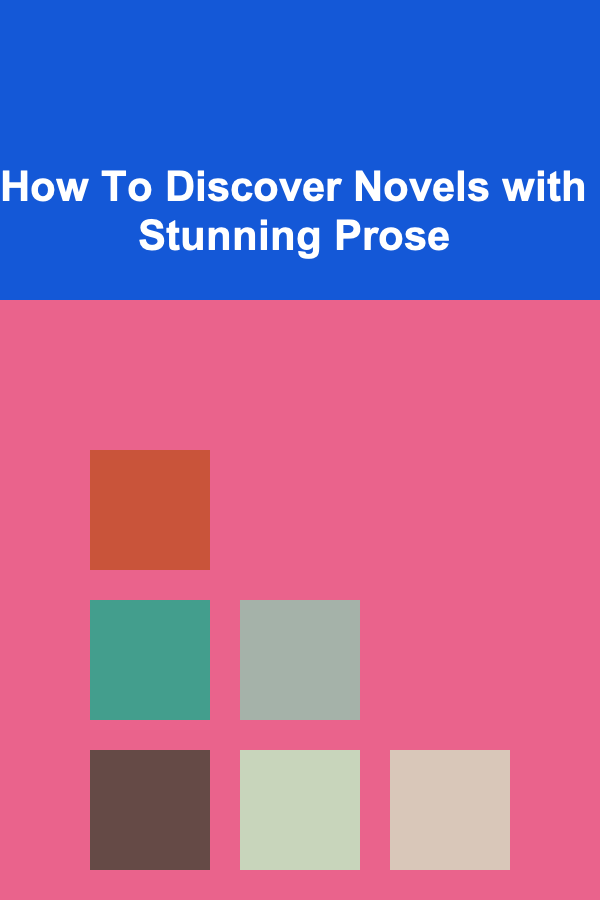
How To Discover Novels with Stunning Prose
ebook include PDF & Audio bundle (Micro Guide)
$12.99$9.99
Limited Time Offer! Order within the next:

The allure of a captivating novel often lies not just in its plot or characters, but in the exquisite beauty of its prose. Stunning prose elevates a story, transforming it from a simple narrative into a work of art. It's the carefully chosen words, the rhythmic flow of sentences, the vivid imagery, and the subtle nuances that resonate long after the final page is turned. But how does one actively seek out and discover these literary gems, those novels that offer not only a compelling story but also a breathtaking linguistic experience? This exploration delves into the methods, resources, and considerations involved in uncovering novels with truly stunning prose.
Understanding Stunning Prose: Defining the Criteria
Before embarking on the hunt, it's crucial to understand what constitutes "stunning prose." This is, of course, subjective, but certain elements consistently contribute to its effectiveness. It's not simply about using large words or flowery language; it's about precision, artistry, and the ability to evoke emotion and create vivid impressions in the reader's mind. Key elements include:
- Imagery: The use of descriptive language to create vivid mental pictures for the reader. Strong imagery appeals to the senses and allows the reader to fully immerse themselves in the world of the story.
- Figurative Language: Metaphors, similes, personification, and other figures of speech add depth and complexity to the prose, allowing the author to convey meaning in creative and evocative ways.
- Rhythm and Cadence: The flow and rhythm of sentences, achieved through careful attention to word choice, sentence structure, and punctuation, can significantly impact the reader's experience. A skilled writer uses rhythm to create a musicality that enhances the overall impact of the prose.
- Voice and Tone: The unique personality and attitude of the narrator or author, conveyed through word choice and sentence structure. A distinct and compelling voice can make the prose instantly recognizable and memorable.
- Precision and Clarity: While beautiful prose can be complex, it should never be unclear or confusing. A skilled writer uses precise language to convey their meaning effectively and avoid ambiguity.
- Originality and Innovation: Prose that pushes boundaries and challenges conventional writing styles can be particularly striking. This might involve experimenting with sentence structure, word choice, or narrative voice.
It's important to remember that stunning prose serves a purpose. It's not simply decoration; it's integral to the story's meaning and impact. The beauty of the language should enhance the narrative, not distract from it.
Strategies for Discovery: Where to Look
Finding novels with stunning prose requires a proactive approach. Here are several strategies that can help you uncover these literary treasures:
1. Exploring Award-Winning Literature:
Literary awards, such as the Booker Prize, the Pulitzer Prize for Fiction, the National Book Award, and the Women's Prize for Fiction, often recognize novels with exceptional writing. While award-winning status doesn't guarantee stunning prose in every case, it's a strong indicator that the novel has been recognized for its literary merit, which often includes the quality of its writing.
Actionable Steps:
- Research past winners and shortlists: Browse the websites of major literary awards and create a reading list of novels that pique your interest.
- Read reviews and critiques: Look for reviews that specifically mention the quality of the prose. Pay attention to critics who highlight the author's use of language, imagery, and style.
- Don't be afraid to sample: Download a sample or read the first chapter of a few award-winning novels to see if the prose resonates with you.
2. Delving into "Literary Fiction" Lists and Recommendations:
"Literary fiction" is a broad genre that generally emphasizes artistic merit and stylistic innovation over plot-driven narratives. While not all literary fiction boasts stunning prose, it's a good starting point for your search. Many websites, blogs, and publications curate lists of recommended literary fiction, often highlighting the quality of the writing.
Actionable Steps:
- Explore reputable online book retailers: Check out the "literary fiction" sections of sites like Amazon, Barnes & Noble, and independent booksellers' websites. Look for recommendations and curated lists.
- Follow literary blogs and publications: Subscribe to newsletters and follow blogs that focus on literary fiction and offer insightful reviews. Examples include The Millions, Literary Hub, and The Paris Review.
- Engage with online book communities: Join Goodreads groups or online forums dedicated to literary fiction and ask for recommendations for novels with beautiful prose.
3. Following Recommendations from Authors You Admire:
Authors often have a keen eye for quality writing, and they frequently recommend books that have influenced their own work or that they simply admire. Following the reading recommendations of authors whose prose you already enjoy can be a valuable way to discover new novels with stunning writing.
Actionable Steps:
- Read interviews with your favorite authors: Look for interviews where they discuss their influences or recommend books they've enjoyed.
- Check out their social media: Many authors share their reading recommendations on Twitter, Instagram, or their personal blogs.
- Explore their bibliographies: Sometimes, authors will explicitly cite other works in their own books, providing a direct connection to influential sources.
4. Seeking out Translations of Literary Classics:
Literary classics, particularly those from non-English-speaking countries, often possess a unique beauty and depth of prose. Translators play a crucial role in conveying the nuances and artistry of the original language, and a well-translated classic can offer a truly stunning reading experience. Look for translations by renowned and respected translators.
Actionable Steps:
- Research prominent literary translators: Identify translators who have a reputation for excellence in their field. Some well-known translators include Richard Pevear and Larissa Volokhonsky (Russian literature), Ann Goldstein (Italian literature), and Edith Grossman (Spanish literature).
- Look for translations published by reputable publishers: Publishers specializing in translations, such as Penguin Classics, Oxford World's Classics, and New York Review Books Classics, often prioritize quality and accuracy.
- Compare different translations: If possible, read excerpts from different translations of the same work to see which one resonates with you most.
5. Exploring Independent Bookstores and Libraries:
Independent bookstores and libraries are valuable resources for discovering hidden gems and works that might not be widely publicized. Booksellers and librarians often have a deep knowledge of literature and can provide personalized recommendations based on your preferences.
Actionable Steps:
- Visit your local independent bookstore: Browse the shelves, talk to the booksellers, and ask for recommendations based on your interest in novels with beautiful prose.
- Explore your local library: Libraries often have curated collections of literary fiction and offer book clubs and other events that can help you discover new authors and titles.
- Attend book readings and signings: These events provide an opportunity to hear authors read from their work and learn more about their writing process.
6. Leveraging Online Reviews and Literary Criticism:
Online reviews and literary criticism can provide valuable insights into the quality of a novel's prose. Look for reviews that go beyond simple plot summaries and delve into the author's writing style, use of language, and overall artistic merit. Be discerning, and consider the source of the review.
Actionable Steps:
- Read reviews from reputable sources: Look for reviews in established publications like The New York Times Book Review, The Guardian, and The Los Angeles Review of Books.
- Pay attention to specific language: Look for reviews that specifically mention the author's use of imagery, figurative language, rhythm, and voice.
- Consider the reviewer's perspective: Keep in mind that reviews are subjective, and what one reader considers stunning prose, another might find overwrought or pretentious.
Evaluating Prose: Developing Your Own Criteria
While external recommendations and reviews can be helpful, ultimately, the evaluation of prose is a personal experience. Developing your own criteria and learning to identify the elements of stunning prose will make your search more effective and rewarding. Consider these factors when evaluating a novel's prose:
1. Pay Attention to the Rhythm and Flow:
Read passages aloud to assess the rhythm and flow of the sentences. Does the prose have a musicality that enhances the reading experience? Are the sentences varied in length and structure, creating a dynamic and engaging rhythm? Or does the prose feel clunky and awkward?
Example: Consider this passage from Cormac McCarthy's Blood Meridian:
"They rode on and the sun in the east flushed pale streaks of light and then a deeper run of color like blood seeping up in sudden reaches flaring planewise and where the earth lay flat and dense she entered into the dawn and they rode in her shadow."
Notice the deliberate rhythm and cadence, created through the use of long, flowing sentences and vivid imagery. The repetition of sounds ("seeping up in sudden reaches") further enhances the musicality of the prose.
2. Analyze the Use of Imagery and Figurative Language:
Identify and analyze the author's use of imagery and figurative language. Are the images vivid and evocative? Do the metaphors and similes add depth and complexity to the prose? Or do they feel cliché or forced?
Example: Consider this passage from Virginia Woolf's Mrs. Dalloway:
"The motor car with its blinds drawn and with its chauffeur in livery, which, for some reason, rather like a cockatoo, stood insolently blocking the pavement."
Woolf's use of the simile "rather like a cockatoo" is both unexpected and illuminating. It captures the ostentatious and slightly ridiculous nature of the motor car, adding a layer of social commentary to the prose.
3. Consider the Author's Voice and Tone:
Pay attention to the author's voice and tone. Is the voice distinct and compelling? Does the tone align with the subject matter and overall mood of the novel? Or does the voice feel generic and the tone inconsistent?
Example: Consider the distinctive voice of Humbert Humbert in Vladimir Nabokov's Lolita:
"Lolita, light of my life, fire of my loins. My sin, my soul. Lo-lee-ta: the tip of the tongue taking a trip of three steps down the palate to tap, at three, on the teeth. Lo. Lee. Ta."
Nabokov's use of language is both seductive and disturbing, reflecting the complex and unreliable nature of Humbert's narration. The rhythmic repetition and evocative imagery create a voice that is both memorable and unsettling.
4. Evaluate the Precision and Clarity of the Language:
Assess the precision and clarity of the language. Does the author use language effectively to convey their meaning? Is the prose clear and concise, or is it unnecessarily complex and convoluted? Does the language enhance the story or distract from it?
Example: While some authors intentionally employ ambiguity and complexity, clarity is generally valued. Consider the directness of Ernest Hemingway's style in The Old Man and the Sea.
"He was an old man who fished alone in a skiff in the Gulf Stream and he had gone eighty-four days now without taking a fish."
The simplicity and directness of Hemingway's prose allows the reader to focus on the story and the emotional depth of the characters.
5. Reflect on the Overall Impact of the Prose:
Ultimately, the most important criterion for evaluating prose is its overall impact. Does the prose move you, inspire you, or challenge you? Does it create a lasting impression in your mind? Does it enhance your understanding and appreciation of the story? Does it linger in your thoughts long after you've finished reading?
Common Pitfalls to Avoid
While searching for novels with stunning prose, be aware of these common pitfalls:
- Confusing Complexity with Quality: Stunning prose isn't necessarily complex or difficult to understand. Sometimes, the most beautiful writing is also the most clear and concise. * Being Seduced by Style Over Substance: Don't be swayed by superficial flourishes if the story itself is weak or uninteresting. Stunning prose should enhance the narrative, not compensate for its shortcomings. * Ignoring Your Own Preferences: What one reader considers stunning prose, another might find pretentious or overwrought. Trust your own judgment and choose novels that resonate with you personally. * Limiting Yourself to Established Authors: Don't be afraid to explore works by lesser-known or emerging authors. You might be surprised by the hidden gems you discover. * Focusing Solely on Western Literature: Explore literature from different cultures and languages to broaden your horizons and discover new perspectives on language and storytelling.
Conclusion: The Ongoing Journey of Discovery
The quest for novels with stunning prose is an ongoing journey of discovery. By employing the strategies outlined above, developing your own criteria for evaluation, and remaining open to new and unexpected voices, you can unlock a world of literary beauty and enrich your reading experience in profound ways. The beauty of language awaits; embrace the challenge and discover the novels that will leave you breathless with their stunning prose.

How to Create a Minimalist Approach to School Supplies
Read More
How to Soundproof a Room for Better Audio Clarity
Read More
How to Spot Emerging Neighborhoods for Investment
Read More
How To Create a System for Idea Capture
Read More
How to Apply Stoic Wisdom to Modern Life Challenges
Read More
How to Know When You're Ready to Date Again
Read MoreOther Products

How to Create a Minimalist Approach to School Supplies
Read More
How to Soundproof a Room for Better Audio Clarity
Read More
How to Spot Emerging Neighborhoods for Investment
Read More
How To Create a System for Idea Capture
Read More
How to Apply Stoic Wisdom to Modern Life Challenges
Read More